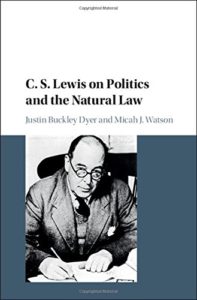In my study of C. S. Lewis while preparing my new book about his influence on Americans, I was constantly confronted with the opposite of what I had been told about him with regard to his views on politics and government. Lewis didn’t like the subject, I was told. Yet he mentioned it rather frequently in his letters to Americans.
Then, as I re-read a lot of his essays, I again was surprised by how often he commented on the principles of good government and how often he critiqued what he witnessed taking place in his own government.
 So I included many of his comments on government in my book. Now I’m delighted to find there is another new Lewis book that emphasizes that insight. I’m in the process of reading it, but I already like its thesis. C. S. Lewis on Politics and the Natural Law is one that some of you might like to purchase (after first getting America Discovers C. S. Lewis, of course).
So I included many of his comments on government in my book. Now I’m delighted to find there is another new Lewis book that emphasizes that insight. I’m in the process of reading it, but I already like its thesis. C. S. Lewis on Politics and the Natural Law is one that some of you might like to purchase (after first getting America Discovers C. S. Lewis, of course).
In light of our current presidential election and what I consider the awful choices placed before us, I think it is instructive to turn to some of Lewis’s commentary on good government.
For instance, in his excellent essay, “The Poison of Subjectivism,” he ends with these thoughts about voting, which I believe have a direct application to our present situation:
Unless we return to the crude and nursery-like belief in objective values, we perish. If we do, we may live, and such a return might have one minor advantage. If we believed in the absolute reality of elementary moral platitudes, we should value those who solicit our votes by other standards than have recently been in fashion.
While we believe that good is something to be invented, we demand of our rulers such qualities as “vision,” “dynamism,” “creativity,” and the like. If we returned to the objective view we should demand qualities much rarer, and much more beneficial–virtue, knowledge, diligence, and skill.
“Vision” is for sale, or claims to be for sale, everywhere. But give me a man who will do a day’s work for a day’s pay, who will refuse bribes, who will not make up his facts, and who has learned his job.
What are we looking for in our candidates today? Far too few seek virtue and honesty in those we put forward to lead.
Another of his essays—one of my favorites—“Is Progress Possible? Willing Slaves of the Welfare State,” takes aim directly at our desire to have the state take care of us. He ends that essay with this dire warning:
What assurance have we that our masters will or can keep the promise which induced us to sell ourselves? Let us not be deceived by phrases about “Man taking charge of his own destiny.” All that can really happen is that some men will take charge of the destiny of the others.
They will be simply men; none perfect; some greedy, cruel, and dishonest. The more completely we are planned the more powerful they will be. Have we discovered some new reason why, this time, power should not corrupt as it has done before?
And what of those who are already corrupt and are now seeking to be our masters? Sober thoughts as we go through this election season.
